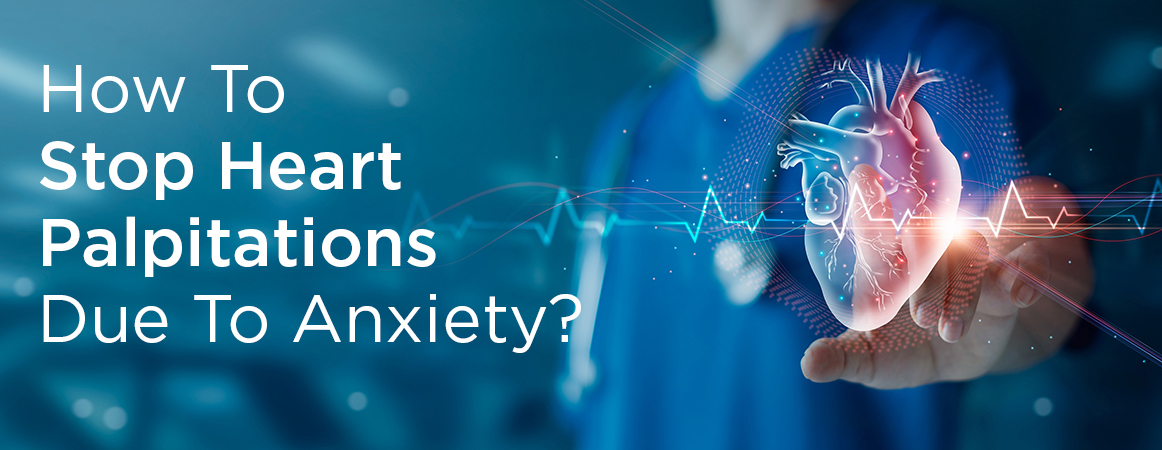How To Stop Heart Palpitations Due To Anxiety?
Heart palpitations, that fluttering sensation in your chest, can be a disconcerting experience, especially when triggered by anxiety. Understanding the connection between anxiety and heart palpitations is the first step towards regaining control.
For any concerns related to your heart, consider consulting a top cardiologist in Karachi at MMI. Gain valuable insights into your heart health by seeking the expertise of our top-notch cardiologists, dedicated to providing comprehensive care and precise evaluations.
Calming the Storm Within: Strategies to Stop Heart Palpitations Due to Anxiety
In this blog, we’ll explore effective strategies to halt those palpitations, ranging from mindful breathing and regular exercise to prioritizing sleep and reducing stimulant intake. By delving into these methods, individuals can regain control over their cardiovascular well-being and navigate the nexus of anxiety and heart palpitations with a sense of empowerment and calm assurance.
Acknowledge and Identify Triggers
The journey to stopping heart palpitations begins with self-awareness. Determine the particular triggers that cause your anxiety. Whether it’s work-related stress, social situations, or personal concerns, recognizing these triggers empowers you to take proactive steps in managing them.
Deep Breathing and Relaxation Techniques
Deep breathing exercises and relaxation techniques are powerful tools to counteract anxiety-induced heart palpitations. Practice diaphragmatic breathing by inhaling deeply through your nose, allowing your abdomen to expand, and exhaling slowly through pursed lips. Incorporating mindfulness meditation or progressive muscle relaxation can further promote a sense of calm.
Regular Exercise for Stress Management
Physical activity is a natural stress reliever that can significantly reduce anxiety and, consequently, heart palpitations. Regular exercise, such as brisk walking, jogging, yoga, or any other activity you enjoy, is essential. Exercise releases endorphins, the body’s natural mood enhancers, which can positively impact your mental and cardiovascular well-being.
Establish a Consistent Sleep Routine
Inadequate sleep can exacerbate anxiety and contribute to heart palpitations. Maintain a consistent sleep schedule and develop a calm bedtime routine to prioritize great sleep. Ensure your sleep environment is conducive to rest, minimizing exposure to screens before bedtime and creating a quiet, dark space.
Limit Stimulants and Caffeine Intake
Stimulants like caffeine can heighten anxiety and trigger palpitations. Reduce or eliminate the consumption of caffeinated beverages, energy drinks, and stimulant-containing medications. Opt for calming herbal teas or water to stay hydrated without the potential negative effects of caffeine.
Stay Hydrated and Maintain Balanced Nutrition
Dehydration and poor nutrition can contribute to feelings of unease and palpitations. Keep yourself hydrated by drinking water throughout the day. Consume a balanced diet rich in fruits, vegetables, lean proteins, and whole grains to support both your physical and mental well-being.
Seek Professional Support
If anxiety and heart palpitations persist, seeking professional support is crucial. Consult with a mental health professional to explore therapeutic interventions, such as cognitive-behavioral therapy (CBT), which can help address underlying anxiety triggers and provide coping mechanisms.
For those experiencing persistent heart palpitations due to anxiety, it’s essential to recognize the vital role of cardiology hospitals and top cardiologists in Karachi.
MMI, a reputable cardiology hospital in Karachi, serves as a cornerstone for individuals seeking comprehensive care for their cardiovascular health. Equipped with state-of-the-art facilities and a team of experienced healthcare professionals, Memon Medical Institute Hospital plays a pivotal role in evaluating and managing cardiac conditions. Regular check-ups and consultations with cardiologists contribute to proactive heart health management.
Consulting with a top cardiologist at MMI Cardio Hospital, Karachi, ensures a thorough assessment of your heart health, ruling out any underlying cardiac concerns and providing personalized guidance on managing anxiety-induced palpitations.
Conclusion
Stopping heart palpitations due to anxiety requires a holistic approach that addresses both mental and cardiovascular well-being. By implementing mindful strategies, embracing healthy lifestyle choices, and seeking professional support when needed, individuals can regain control over their heart health.
With the presence of top cardiologists in Karachi, your cardiovascular well-being is our priority at MMI Cardiac Hospital, Karachi, ensuring you receive personalized guidance and the highest standard of cardiac care.
Remember, understanding and managing anxiety is not only a gift to your mind but also a vital investment in the health of your heart.


